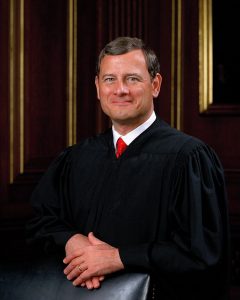September 17, 2018 •
Chief Justice Roberts Stays FEC Campaign Finance Disclosure Regulation
On September 15th, Chief Justice of the United States John G. Roberts, Jr. issued an order staying a lower federal district court’s order invalidating a Federal Election Commission (FEC) campaign finance disclosure regulation. Robert’s stay was decided on Saturday after […]
 On September 15th, Chief Justice of the United States John G. Roberts, Jr. issued an order staying a lower federal district court’s order invalidating a Federal Election Commission (FEC) campaign finance disclosure regulation. Robert’s stay was decided on Saturday after the U.S. Court of Appeals for the District of Columbia Circuit denied an emergency motion for the stay made earlier the same day.
On September 15th, Chief Justice of the United States John G. Roberts, Jr. issued an order staying a lower federal district court’s order invalidating a Federal Election Commission (FEC) campaign finance disclosure regulation. Robert’s stay was decided on Saturday after the U.S. Court of Appeals for the District of Columbia Circuit denied an emergency motion for the stay made earlier the same day.
On August 3, a federal district court had ruled a campaign finance disclosure regulation, followed for decades by the FEC, failed to uphold disclosure requirements required by a federal statute. Chief Judge Beryl A. Howell of the United States District Court for The District of Columbia issued an order, in CREW v. FEC, vacating 11 C.F.R. §109.10(e)(1)(vi), but stayed the vacatur for 45 days to give time for the FEC to issue interim regulations comporting with the statutory disclosure requirements of 52 U.S.C. §30104(c). The court also has allowed the FEC 30 days to change an earlier FEC dismissal to conform with the court’s ruling.
The case originated because of independent expenditures made in a 2012 Ohio senate race by the non-political social-welfare nonprofit Crossroads Grassroots Policy Strategies (Crossroads GPS), an affiliate of the American Crossroads Super PAC. Crossroads GPS did not report donors when reporting its independent expenditures, while it acknowledged receiving contributions over $200, arguing the donors did not donate funds directly tied to any specific reported expenditure, as the FEC interpreted 11 C.F.R. §109.10(e)(1)(vi) to require. Non-political committees making independent expenditures over $250 in a calendar year must comply with disclosure obligations closely analogous to those imposed on political committees.
The vacated regulation required the identification of each person who made a contribution in excess of $200 to the person filing a disclosure report, including for non-political 501(c)(4) non-profit entities making independent expenditures, if the contribution was made for the purpose of furthering the reported independent expenditure. The district court found the regulation, as construed and applied by the FEC, did not require the disclosure of donors, absent the donor’s express agreement that the funds be used for the specific expenditures reported to the FEC, even though the donor may otherwise support and in fact contribute for the purpose of funding those expenditures.
The district court found the regulation impermissibly narrows the mandated disclosure in 52 U.S.C. §30104(c)(2)(C), which requires the identification of such donors contributing for the purpose of furthering the non-political committee’s own express advocacy for or against the election of a federal candidate, even when the donor has not expressly directed that the funds be used in the precise manner reported.
November 7, 2011 •
American Crossroads Wants Candidate Participation in its Ads
Asks FEC
 The Federal Election Commission has received an advisory opinion request asking if an independent expenditure-only PAC may use incumbent members of congress in its advertisements.
The Federal Election Commission has received an advisory opinion request asking if an independent expenditure-only PAC may use incumbent members of congress in its advertisements.
Independent expenditure PAC American Crossroads has formally requested it be allowed to produce and distribute television and radio advertisements featuring on camera footage or voice-overs of incumbent members of congress up for re-election. Conceding the purpose of the ads would be to improve the public’s perception of the congress member, the advertisements would focus on policy and legislative issues.
American Crossroads is seeking confirmation and guidance as to whether the advertisements qualify as coordinated communications, are in-kind contributions, or may limit the PAC’s ability to independently expend funds in favor of the candidate.
The advisory opinion request can be found here.
State and Federal Communications, Inc. provides research and consulting services for government relations professionals on lobbying laws, procurement lobbying laws, political contribution laws in the United States and Canada. Learn more by visiting stateandfed.com.


